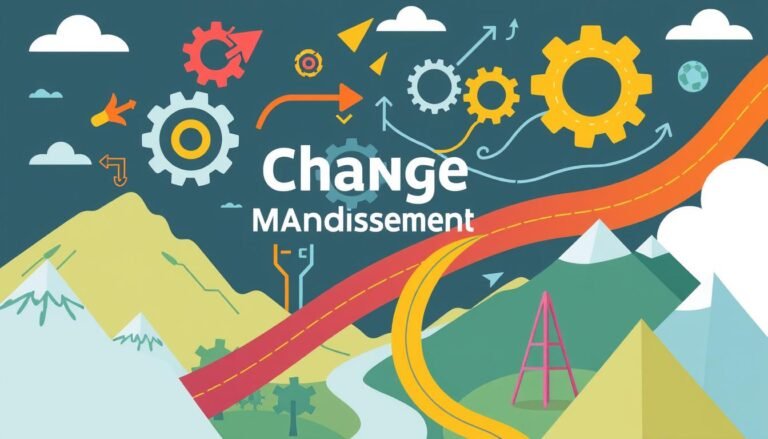How can HR professionals in Ireland address the skills shortage in key sectors?
The skills shortage in Ireland worries many employers, especially in IT and technology. As companies go digital, there aren’t enough skilled workers. To fix this, HR experts need to use smart HR strategies in Ireland. They can do this by focusing on training, development programs, and looking for talent beyond Ireland, even into the EU.
One key way to tackle the workforce gaps is with training and mentoring inside the company. This can make employees more skilled fast. Looking at talent from the EU can help, thanks to the freedom to move and work.
Outsourcing tasks can also quickly fill important skill gaps. Employers should consider hiring millennials for tech and IT jobs. They often have great skills and new ideas.
Talking to possible employees on social media is a big deal. It helps attract and keep talent during this skills shortage, which is big in fields like healthcare, construction, and finance. By using clever HR and new hiring methods, companies can get the people they need to stay competitive and do well.
Current State of Skills Shortage in Ireland
In Ireland, the work scene is tough, especially for jobs in tech and healthcare. These areas need more people with specific skills because of fast changes and high standards. Many businesses and services feel the impact of not having enough tech-savvy workers.
High Demand for Specialized Skills
More healthcare pros are needed because Ireland’s population is getting older. This need comes at a tough time, with many already feeling the pinch. A recent survey showed 90% of responders faced skills shortages last year. Having strong leaders is key to handling this challenge and keeping talented workers.
Education and Training Gaps
Unfortunately, education and training in Ireland are falling behind what the job market needs. Only 14% of adults took part in learning last year. This is much lower than places like Sweden and Finland. The gap between what schools teach and what jobs need is causing problems, especially for new job starters.
Demographic Factors
The growing number of older people is making it harder to find enough healthcare workers. There are also big issues with the cost of living and homes since 2023. These have led to more people changing jobs. More folks are also working from home part-time, changing how the job market works in Ireland.
Importance of Skills Gap Analysis
In today’s tough business world, doing a deep skills gap analysis is very important. It helps figure out what skills an organization lacks. Then, HR pros can work to make their team better by spotting the right needs.
Identifying Critical Skills
Doing a detailed skills gap analysis is key to knowing what skills matter most. This method looks at what skills are needed, checks the team’s skills, and acts on the findings. It’s a way to fix soft skills issues, which often lead to new hires not working out; 89% of failures come from lacking these skills, says Leadership IQ.
Analyzing Industry Requirements
Knowing exactly what industries need helps in making workforce plans that work well. A deep look at the job market helps HR pros tailor their training to what’s really needed. Getting insights from surveys, quizzes, and talks with managers and others gives a full picture of what employees do well and what they need to work on. Filling these skill gaps not only cuts down on leaving jobs but also makes for a team that’s more ready to face new tasks.
How can HR professionals in Ireland address the skills shortage in key sectors?
In Ireland, HR pros are dealing with a big issue: the lack of skilled workers, especially in tech. They’re using smart HR tactics to fix this. First off, they focus on creating strong workforce development plans. Leaders often worry about not having enough skilled workers, so they know action is needed.
To make their team stronger, companies are training and mentoring their staff. This helps fill any gaps in skills. It also makes workers happier and more likely to stay. Also, companies in Ireland can look to hire skilled folks from other European countries. Doing this makes their team more diverse. Plus, it brings in new ideas for innovation.
Outsourcing is another tool for quickly getting the skills you need. It allows companies to work with skilled professionals without hiring them full-time. This can help keep projects moving, even when local skills are lacking. Working with millennials can also be a game-changer. Their tech skills and fresh thinking are very important today.
Keeping in touch with job seekers using social media and new hiring platforms is key. Good communication helps companies stand out, attracting more talent. In fields like healthcare and finance, where finding skilled workers is tough, soft skills are very important. Things like teamwork and creative problem-solving are essential today.
Building a great employer image helps draw in skilled workers and keep current ones happy. Sharing real stories about how team members grow in the company can do wonders. Lastly, creating a culture that values learning, respect, and safety is important. This keeps the company strong, even during tough times in the job market.
Effective Talent Acquisition Strategies
In today’s world, finding the right people, especially in IT and technology, is very hard. Irish employers must use smart strategies to meet this challenge. They should aim for strategies that fit their future plans. This helps them fill job gaps and find new team members more easily.
Leveraging Social Media and Networking
Using social media and making professional connections has changed how companies find new employees. Sites like LinkedIn, Twitter, and Glassdoor help HR teams talk to possible hires directly. This way, their search is not limited to the usual paths. It also makes the company look good, giving job seekers a good impression. Joining online groups that focus on your type of work can help too. They can offer a wider range of candidates. Studies show that using social media makes it easier to talk to potential hires.
Collaborating with Recruitment Agencies
Getting help from recruitment agencies can make hiring easier and quicker. They have lots of experience and connections. So, they can find the best candidates faster. This helps in-house HR teams focus on other important tasks. Agencies also keep you up to date with the latest hiring trends.
By training your own people too, you might not need as much help from outside. This builds a strong team that can grow on its own. A clear vision and good pay also attract top people and keep them interested.
Employee Training and Development
Many organizations see employee training as key to staying ahead in the market. Tackling skills gaps and building a skilled, adaptable workforce is done through training programs. These help keep a company on the cutting edge.
Implementing Mentorship Programs
Implementing mentorship in the workplace is crucial. It allows employees to get personalized help. They can learn new skills and grow in their careers. This helps businesses in Ireland keep their staff happy and engaged.
Experienced mentors give advice and support. This makes employees feel valued and inspired. It boosts the organization’s productivity and creativity.
Continuous Learning Opportunities
Coming across new learning chances is important for employees. It helps them keep up with new technology. Unfortunately, only 14% of adults in Ireland took part in education in 2021. This is way less than in places like Sweden and Finland.
By prioritizing lifelong learning, companies can fill skill gaps and draw in top talent. They become places where people want to work. This is because these companies care about their employees’ growth.
In the end, mentorship and continuous learning make a business ready for the future. HR managers can make their companies great places to work. They do this by focusing on learning and development.
Fostering Industry-Academia Collaboration

In 2021, only 14% of Irish adults aged 25-64 took part in education or training. This rate is higher than the EU average but lower than Sweden and Finland. For Ireland, this shows the urgent need for better connections between schools and businesses.
Collaborative training programs are key to filling the skills gap. They link what students are learning with what companies need. This prepares newcomers to meet the job’s demands. Also, internships and projects help students get real-world skills, setting them up for success.
A recent OECD report says lifelong learning is crucial for staying competitive. With tech advancements like AI, up to 14% of jobs worldwide might change by 2030. So, it’s important to invest in skills like critical thinking and digital know-how early.
Enterprise Ireland’s Spotlight on Skills program helps companies spot and fix their skills needs. By working closely with schools, businesses get access to skilled grads. This benefits both the companies and the country’s economy.
“Investment in training and upskilling is crucial,” McKinsey states, likening the current educational needs to the industrial transformations of the early 20th century.
To prevent a skills shortage, teamwork between the government, companies, and schools is vital. By creating good connections and training programs, we can get the workforce ready for future jobs. This way, Ireland’s job market stays strong and steady.
Innovative Workforce Planning Solutions
With technology changing fast and a limited job market, companies must get creative with their planning. Skills-based hiring and using analytics in HR are great ways to tackle these issues. They help find the right people for the job and deal with a lack of certain skills effectively.
Skills-Based Hiring Practices
When hiring, look at what candidates can do, not just what degrees they have. This way, HR can find the best fit for each job based on actual abilities. Only a small percentage of people in Ireland did extra training last year, so focusing on skills is crucial. This is especially true when many companies report a lack of needed skills.
This alternative approach makes the hiring process fairer and more efficient. It helps match jobs with people who are truly ready to succeed.
Use of Data Analytics in Recruitment
Data analytics boosts HR’s ability to find the right talent. It allows for detailed information to guide hiring decisions. A growing number of HR teams in Ireland are tapping into this resource. They are using hard data to make their recruitment processes better.
This method helps companies predict what skills they will need in the future. Thanks to data, they can plan early and stay ahead. In a world where job roles are changing rapidly, this insight is invaluable. Automation is picking up quickly, making efficient recruitment strategies even more vital.
Automating parts of HR is already common in Ireland. With more tasks handled by technology, HR can focus on strategic hiring. Data-driven approaches not only streamline the process but help attract the best talent. This is essential for companies that want to stand out in a competitive job market.
Employee Retention Initiatives
Keeping our best employees is vital today. About 90% of a recent survey in Ireland showed a lack of skills. This makes retention programs critical for a solid team. Leadership training stands out as a top need, with two-thirds of companies planning to boost it in the next few years.
It’s not just about high salaries. Workers want to be valued, respected, and have chances to grow. Offering chances to learn more and improve skills is key. Also, using data to better understand what employees need can help keep them happy.
The high cost of living and housing issues in 2023 made more people change jobs. To keep them, it’s essential to offer flexible work and attractive benefits. Giving regular updates and keeping in touch with employees boosts their satisfaction and loyalty.
Diversity is also key, with 93% of HR teams in Ireland backing it. It makes work more welcoming and ensures everyone feels their worth. Using referrals to hire often keeps people longer, as they fit in better with the team.
To wrap up, a mix of leadership growth, lifelong learning, flexible jobs, and a welcoming atmosphere can greatly reduce people leaving. When employees are happy and feel supported, companies beat the challenges of not having enough skilled workers. This way, they build a team that’s both strong and committed.
Conclusion
In Ireland, tackling the skills shortage needs a mix of strategies. We must use smart HR ideas and keep training our staff. It’s vital for everyone, from workers to bosses, to work together on this. Currently, only 14% of Ireland’s adults are in the education system or getting trained. But, we can do better by looking at how countries like Sweden and Finland are ahead in learning for life.
The world is changing fast. By 2030, about 375 million people might need new jobs because of digital growth. This is why Ireland should focus on skills that technology won’t easily replace. With the right skills, our workers can stay ahead in the changing job market.
A strong team effort can help Ireland beat the skills shortage. This means the government, schools, companies, and individuals all work together. We can do it by making job hunting easier, considering more work-from-home jobs, and making hiring better. By thinking globally and working hard to keep our best employees, we can overcome the skills gap. This will make for a stronger future.








